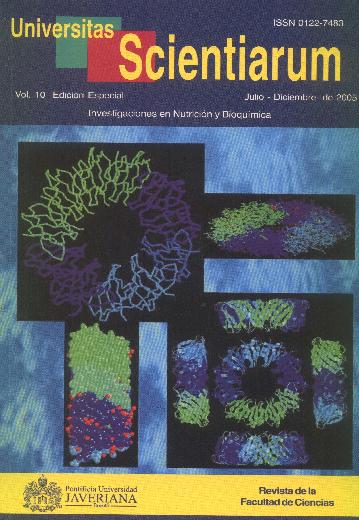Abstract
Este trabajo describe la respuesta del perfil lipídico según el genotipo de la apolipoproteína E en personas con diabetes mellitus tipo 2 y la presencia o no de riesgo cardiovascular, por medio de la revisión sistemática de artículos científicos publicados entre 1990 y 2003. Seis estudios cumplieron con los criterios de inclusión y fueron seleccionados para realizar el trabajo de investigación. Inicialmente se realizó una descripción de características generales de los estudios y se utilizó la prueba estadística Chi - cuadrado para determinar diferencias entre grupos. Se encontró que el 66.6% de los artículos fueron realizados en Europa, el promedio de personas de los estudios fue de 473 y el promedio de edad estuvo en los 58 años. La distribución del genotipo E 3/3 (78.2%), fue la de mayor prevalencia en los diferentes grupos de diabéticos, seguido de E 4/3 en 12.8% y E 3/2 con un 8.7%. Las fracciones lipídicas más elevadas en los estudios fueron las de colesterol total, colesterol LDL y triglicéridos. Se observó que el polimorfismo de la apo E influye sobre el perfil lipídico, y por tanto, en el desarrollo de la enfermedad cardiovascular en los sujetos con DM tipo 2.Univ. Sci. is registered under a Creative Commons Attribution 4.0 International Public License. Thus, this work may be reproduced, distributed, and publicly shared in digital format, as long as the names of the authors and Pontificia Universidad Javeriana are acknowledged. Others are allowed to quote, adapt, transform, auto-archive, republish, and create based on this material, for any purpose (even commercial ones), provided the authorship is duly acknowledged, a link to the original work is provided, and it is specified if changes have been made. Pontificia Universidad Javeriana does not hold the rights of published works and the authors are solely responsible for the contents of their works; they keep the moral, intellectual, privacy, and publicity rights. Approving the intervention of the work (review, copy-editing, translation, layout) and the following outreach, are granted through an use license and not through an assignment of rights. This means the journal and Pontificia Universidad Javeriana cannot be held responsible for any ethical malpractice by the authors. As a consequence of the protection granted by the use license, the journal is not required to publish recantations or modify information already published, unless the errata stems from the editorial management process. Publishing contents in this journal does not generate royalties for contributors.



